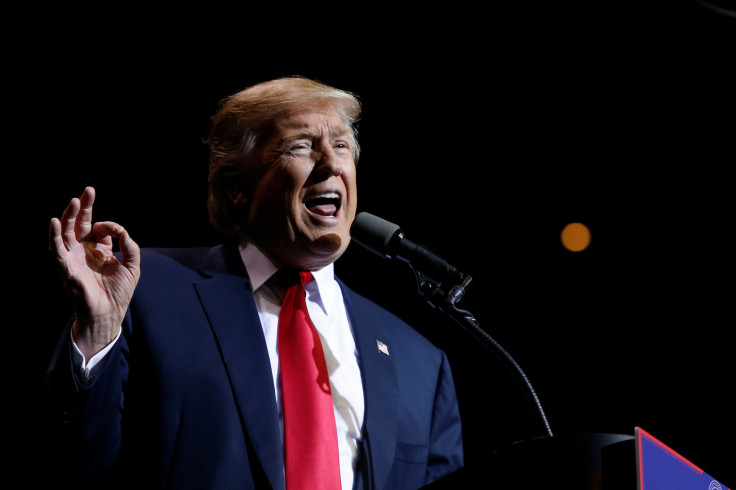Is A Recession Coming? Trump's Economic Plans Could Clash With The Fed's, With Drastic Consequences

Among Donald Trump’s plans for boosting the American economy are, according to most economists, textbook responses to a recession: a tax cut (mostly for the wealthy), a $1 trillion stimulus package and a surge in defense spending. The only problem is that we’re no longer in one, so deploying such measures at this time could be not just counterproductive, but disasterous, some experts say.
Coupled with the Federal Reserve’s likely decision on Dec. 14 to raise the interest rate—a form of contractionary monetary policy that pushes up other interest rates, like those of auto loans and credit card debt, and is meant to rein in inflation and prevent economic instability—Trump’s proposals, many worry, could throw the U.S. economy into a new crisis.
The Fed has said it would wait to increase its target for the federal funds rate until the economy has sufficiently picked up steam, delaying the hike in both September and November on account of inflation stubbornly staying below 2 percent and only moderate job growth. The central bank uses the interest rate as a monetary policy tool by lowering it to encourage more borrowing and investment in times of recession and raising it to inspire more savings while the economy is booming.
Since the recession, the Fed has kept it at or near zero as part of America's economic recovery effort, but on Dec. 14, the Fed is expected to begin a series of incremental federal funds rate increases with mild impacts on the economy. If Trump has his way, however, those hikes could, by necessity, be far from incremental.
The unemployment rate already hit a nine-year low in November, and inflation has inched up to 1.6 percent from 0.8 percent over the past several months, in a sign that the American economy may be ripe for an interest rate hike. But Trump’s proposals could add too much fuel to an economy that's already humming along, triggering a painful but necessary reaction from the Fed in the form of abruptly higher interest rates, economists like the Council on Foreign Relations senior fellow Robert Kahn worry.
“Absent a dramatic expansion in the supply side of the economy, any fiscal stimulus will likely force the Federal Reserve to tighten monetary policy more quickly than currently expected, to counter inflationary pressures in an economy that appears near full employment,” Kahn wrote, referencing the level of employment at which the economy is said to be maximally performing. He added that the Fed’s contractionary response, which will be needed to prevent runaway inflation, would also “neutralize the stimulus effects of Trump’s proposed policies.”
Chicago Federal Reserve Bank President Charles Evans offered a similar warning Monday, when he told an audience at the Executives Club of Chicago that now was not the time for a stimulus, the Chicago Tribune reported.
“We are very close to full employment,” he said, adding that while new roads, highways and bridges were “things we need” and “would be terrific,” he cautioned that a fiscal expansion wasn’t the best idea at the moment, given the current economic climate.
Trump’s fiscal stimulus isn’t the sole element of his economic proposals that would bring about a series of sudden Fed interest rate hikes in the next couple of years. As economists at the research and analytics branch of the credit ratings agency Moody’s wrote in a June report on the expected economic consequences of Trump’s presidency, the president-elect’s plans for mass deportation of undocumented immigrants will also not mix well with the Fed’s intentions.
“Mr. Trump’s immigration policies will... result in fewer jobs, potentially severe labor shortages and higher labor costs,” causing businesses to sell their products at higher prices, the researchers wrote. “The tight job market and higher inflation [will prompt] the Federal Reserve to normalize interest rates quickly, and then to push rates above their long-run equilibrium. This monetary tightening contributes to the recession that hits about a year after Mr. Trump takes office.”
Add to the equation a combination of expanded infrastructure and defense funding and lower taxes for the wealthy, and interest rates could grow further as a result of mounting government debt—something known as “crowding out”—the researchers added. The report names “business investment, housing and other consumer spending” as areas of the economy that would be hit hard by the phenomenon.
The question lies with how much Trump and Fed chair Janet Yellen will be willing to accommodate one another or butt heads in the coming years. With the president-elect saying Yellen should be “ashamed” of her accommodative post-recession policies and Yellen warning that “there’s not a lot of fiscal space” for a major government debt increase, they don’t appear to be off to a good start.
© Copyright IBTimes 2025. All rights reserved.






















